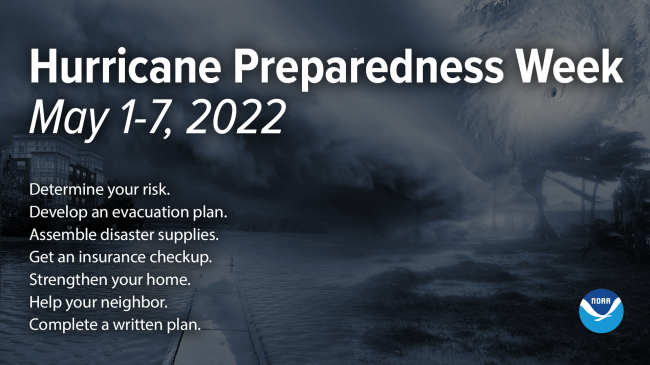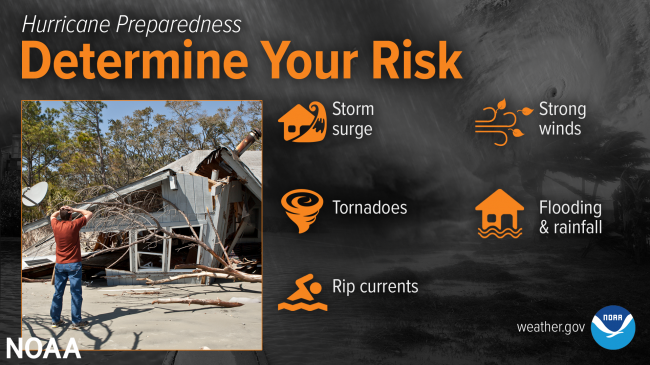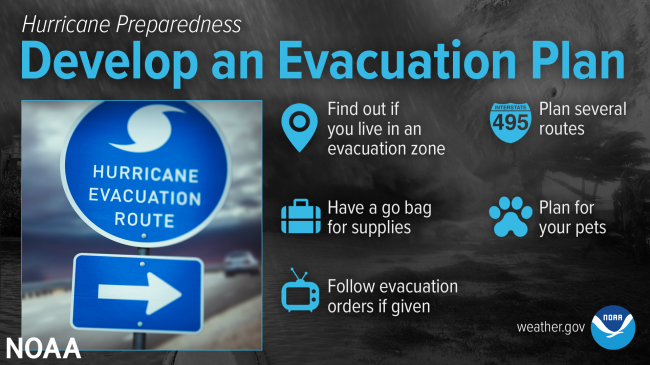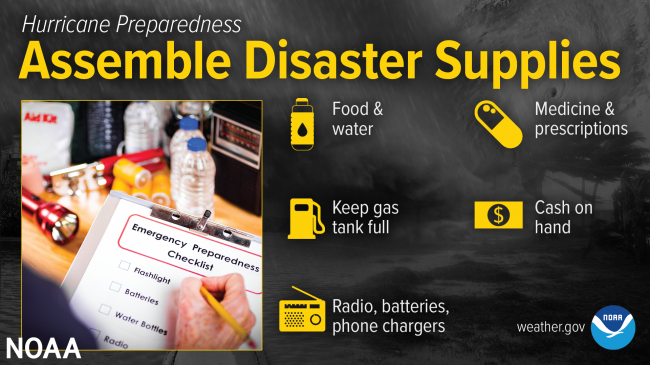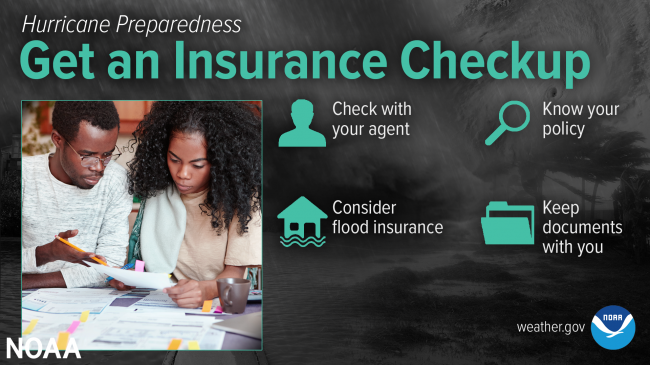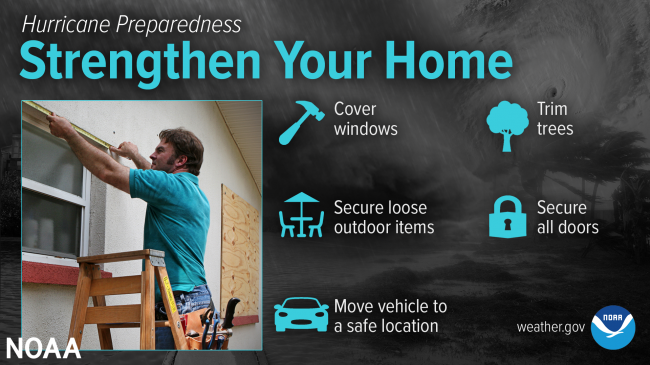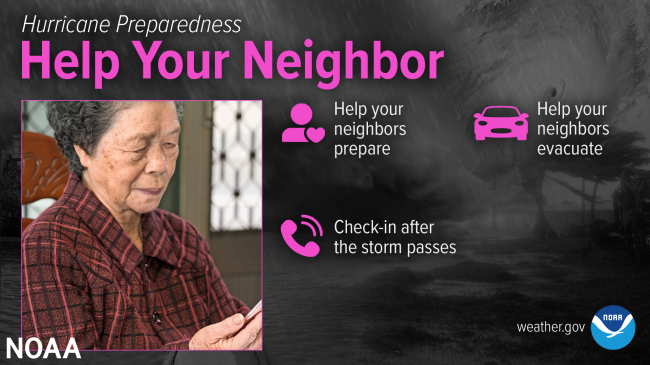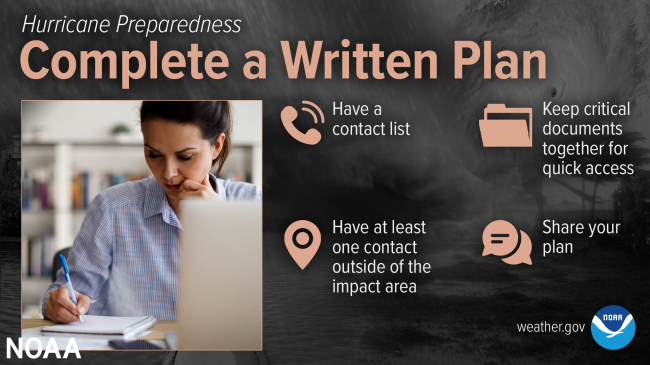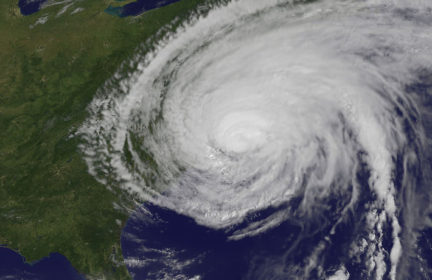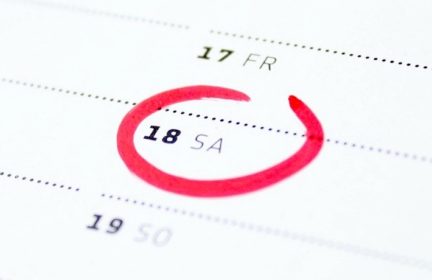Hurricane Preparedness Week May 1-7, 2022
Hurricanes are powerful and very destructive forces of nature that affect millions of people each year. Luckily they are not spur of the moment disasters like a car accident or earthquake and some warning and preparation can be made beforehand to either ride out and withstand the devastation or get to a safer location in time.
NOAA (National Oceanic and Atmospheric Administration) will be releasing a daily tip on social media platforms this next week with advice on how to be better prepared for the upcoming hurricane season. The Prepared will be sharing those tips on our Facebook and Twitter pages as well, along with some additional guidance.
For additional preparation, check out: How to prepare for and survive hurricanes
Feel free to also share your hurricane preparedness tips, stories, and experiences down below.
-
Comments (23)
-
Gideon ParkerStaff - May 1, 2022
Sunday, May 1 — Determine Your Risk
Understand how a hurricane works, what the likelihood of it affecting your neighborhood is, and what the devastation it could cause in your life if you were swept up into it.
The threats from hurricanes to you and your family can vary widely depending on where you live. It’s not just those along the coast that can experience significant, life-threatening impacts. Evaluate what you need to do to protect your home and family NOW, before the first storm of the season even forms. noaa.gov/hurricane-prep
-
Gideon ParkerStaff - May 2, 2022
Monday, May 2 — Develop an Evacuation Plan
Along with an evacuation plan, have a go-bag ready with supplies that you will need to survive and live off of away from home.
Take some time this week – Hurricane Preparedness Week – to make sure you have a hurricane evacuation plan. The first thing you need to do is find out if you live in a storm surge hurricane evacuation zone or if you’re in a home that would be unsafe during a hurricane. If you are, figure out where you’d go and how you’d get there if told to evacuate. You do not need to travel hundreds of miles. Identify someone, perhaps a friend or relative who doesn’t live in an evacuation zone or unsafe home, and coordinate with them to use their home as your evacuation destination. Be sure to account for your pets, as most local shelters do not permit them. Put the plan in writing for you and those you care about. noaa.gov/hurricane-prep
-
EzlyAmuzzed - May 2, 2022
I have been seeing many indications that hurricanes are starting to go into areas that do not traditionally have them and there will be a lot of people who will need this. I remember last year a state (I think NY?) that rarely gets hurricanes has one, and locals were panicking on other preparedness groups. It can be hard balancing informing people the risk but not overreacting when not needed such as they are not in a flood or evacuation zone, it’s only a CAT1, they are further inland, ect.
-
phiguru - May 8, 2022
Fascinatingly, and truly a case of weather being strange, two of the worst hurricanes I have seen were Cat 1/2 and some of the Cat 3/4 were better in the exact spots where I have lived. I used to live in Coastal NC and a Cat 1 caused extreme damage just off the coast – the winds were truly like nothing we had ever seen before or since – snapped nearly all the taller pines at 9-11 feet up the trunk. Everyone had a tree in a car, wall, roof, smashing water pipes. Floyd was a Cat 2 when it hit us and I still weep for the towns that were destroyed.
In VT/NH, the hurricane damage is still being cleaned up after a decade. We lost a bunch of bridges and some communities were isolated without. Because they hit at the end of summer, we don’t have the same supply stores that we have in January. It’s when we are cleaning out freezers, etc.
-
-
M. E.Contributor - May 2, 2022
I have survived many hurricanes. My guess is that most of The Prepared’s readership will be just fine, particularly if they follow the advice in the many articles on this site about the subject. An under appreciated component of hurricane preparedness is that so many people view it as a time-limited event and prepare accordingly. I’ve seen many neighbors, who should know better, focus on the storm’s arrival and pack in just enough supplies for a few days. In my experience getting everything “back to normal” can take many weeks, with power lines down, roads blocked by trees or flooding, staffing shortages for essential services (either they evacuated or are overwhelmed), fuel shortages, etc. I won’t repeat the advice that is listed elsewhere on this site and will simply encourage folks to take the “assumed” impact and multiply it by that number of weeks. If the assumption seems to be a two day impact, plan for two weeks; four days, plan for four weeks, and so on.
-
Alisa Felix - May 3, 2022
I’m curious now about the worst hurricane that you survived. What utilities were affected, what was damaged of yours, what did recovery look like?
-
M. E.Contributor - May 3, 2022
I would say two “worsts”. The first one was worst from a fear perspective. I was not yet an adult and my parents made the very bad decision to stay put rather than evacuate (“how bad can it be?” they thought, despite a mandatory evacuation order). It was freaking TERRIFYING. We thought the house would implode in the middle of the night – it was a vacation rental. I can’t speak to recovery etc. because we left right after. We lucked out that time, but that same area and the house in which we had stayed was completely decimated and washed away in a later hurricane of similar strength. It was eye opening to see the entire neighborhood in which we had stayed just gone. That could have happened to us with us washed out to sea, and it was just luck that it didn’t. My parents admitted later that they deeply regretted their decision!
The second worst was when I lived over one hundred miles inland, and naively thought that would mean we would not be badly affected. This was in fact the beginning of my prepping journey, since I did not prepare at all. We lived in an apartment and were without water or electricity for probably ten days? As were most of the city and the surrounding cities. I wanted to leave to stay with a family member but I hadn’t even bothered to put gas in my car and guess what? Gas pumps don’t work without power, and even if they had worked I could not have paid for the gas because I hadn’t gotten cash and ATMs and credit card machines don’t work without power.
I was eventually able to leave town after a few days but had to survive on snack foods as most grocery stores were sold out of everything. When I returned to my apartment everything was disgusting, because it had not occurred to me that everything in my fridge and freezer would rot and melt into the middle of the floor while I was gone (I should have emptied it before I left but I knew nothing, and did not anticipate that it would take over a week to return).
While none of my property was damaged, many of the cars in the apartment lot were crushed by trees, many of my homeowner friends had their roofs torn off and lots of water damage. The worst was the after-hurricane flooding that took weeks to recede. My doctor’s office was flooded, my friend’s house was flooded, etc. Remember we were over one hundred miles inland. I had some friends who couldn’t move back into their homes for almost a year.
To this day I can tell the difference between people who lived through that hurricane and people who moved here afterward. Those who lived through it keep their cars at least half-gassed up at all times during hurricane season and keep at least a few gallons of water and a few days of food. Those who didn’t think it is all a big “happening” and they make jokes and buy alcohol and potato chips to have hurricane parties instead of doing reasonable things like taking in their lawn furniture and stocking up on ice, medications, tarps, gloves, contractor bags, etc. in addition to the usual preps.
I can speak from experience that it is far, far better to have two weeks’ of supplies and not need them, than the other way around. Thanks to the Prepared the only thing I’ve had to do for the last two hurricanes that came through here was fill my coolers with ice. Everything else is ready and it is such a relief to be able to think clearly and rationally when a Category 4 is headed my way. That is not the time to start preparing. That is the time to double-check the preps you already have.
-
Alisa Felix - May 3, 2022
That has got to be so rewarding to experience two horrible disasters with little to no preparation and now to be at the point where all you have to do is fill up the coolers with ice! Congratulations at getting so far.
People really have drinking hurricane parties? Being intoxicated and not able to function at your best is not the time to be going through a disaster!
-
EzlyAmuzzed - May 3, 2022
As a Floridian I can verify the hurricane parties. On social media people post pics of all the booze and junk food they purchased. It’s so annoying to me that in my hurricane notes I have “avoid social media”
-
Eric - May 7, 2022
“The second worst was when I lived over one hundred miles inland, and naively thought that would mean we would not be badly affected.”
As a Floridian who takes hurricanes very seriously, I would have thought the same thing. When living 10 miles from the beach, I responded to a major hurricane by taking my family to a hotel 60 miles from the beach, which is about as far as you can get without leaving Florida.
Which hurricane? Any idea why it did so much damage so far from the beach?
-
Watermelon Samurai - May 12, 2022
Let me underscore M.E.’s comment that ‘back to normal can take many weeks’.
A friend of mine is an experienced lineman for a power company which supplies much of the Southeast with electricity. In a recent discussion about power outages, he told me a couple of disconcerting things:
– The company has not been investing in infrastructure upgrades. Instead, the policy is just to fix/replace equipment after it breaks. So there is diminishing robustness and redundancy in the electrical infrastructure.
– Equipment is being run closer to its maximum ratings now. This is making it much harder to switch power around the grid. There is a significant risk of overloading existing equipment when trying to route power to locations with outages.
– Supply chain disruptions have drastically extended the lead times for replacement equipment (it’s greater than a year for some of the larger pieces of equipment). Power companies can obtain parts and equipment from other power companies, but when the parts are gone they’re gone, and it will be a long time before replacement equipment will be available.
– They are having a very hard time hiring and retaining line workers.In short, we have an electrical infrastructure that’s operating closer to its limits with less redundancy, parts that are harder to obtain and a shortage of people to install and repair equipment.
So I think it’s reasonable to expect that any significant power outages – especially those caused by tornadoes or hurricanes – could last an uncomfortably long time.
– WS
-
Magic 8 Ball - May 12, 2022
Sure sounds like there is an importance on having a generator or one of those large battery packs. I am very blessed and don’t think I’ve gone a day of my life without power.
-
phiguru - May 12, 2022
I’ve had weeks without power and generator fuel gets precious. Some understanding of what is essential to power and what isn’t is definitely helpful. In my current situation, for 3-5 day outages, I keep a small generator and fuel that allows for essential operations (the freezer, phone, laptop, fish tank bubbler) and we scale back from there, e.g. as soon as the freezer is empty we don’t need to keep it cold.
-
-
Gideon ParkerStaff - May 3, 2022
Tuesday, May 3 — Assemble Disaster Supplies
Assemble the supplies you need now before the stores are sold out of the necessities. It happens every year, so do not get caught up in the “last minute prepping”. https://theprepared.com/homestead/
Just having enough supplies to make it through a hurricane isn’t enough. You need plenty to make it through what could be a LONG recovery period too. Water and electricity could be out for a week or more. Have enough non-perishable food, water and medicine to last each person in your family for a MINIMUM of three days. Also make sure you have extra cash, a battery-powered radio, flashlights, and a portable crank or solar powered USB charger to charge your cell phone. ready.gov/kit
-
Gideon ParkerStaff - May 4, 2022
Wednesday, May 4 — Get an Insurance Checkup
There’s no turnkey “hurricane insurance” product, and it usually involves a mix of policies, like homeowners, flood, and vehicle comprehensive insurance. Learn more at: https://theprepared.com/emergencies/guides/how-prepare-survive-hurricanes/#insurance
This Hurricane Preparedness Week, call your insurance company or agent and ask for an insurance checkup to make sure you have enough homeowners insurance to repair or even replace your home…and remember, standard homeowners insurance doesn’t cover flooding. Whether you’re a homeowner or renter, you’ll need a separate policy for flooding. Act now as flood insurance requires a 30-day waiting period. floodsmart.gov
-
Gideon ParkerStaff - May 5, 2022
Thursday, May 5 — Strengthen Your Home
Tie down your roof and invest in proper hurricane window shutters as part of your preparations for hurricane season. https://theprepared.com/emergencies/guides/how-prepare-survive-hurricanes/#homeprep
There’s a lot you can do around your home to help protect it from hurricane winds. Take action now before hurricane season begins. Have the proper plywood, steel or aluminum panels to board up the windows and doors. Remember, the garage door is the most vulnerable part of the home, so it must be able to withstand high winds.
-
M. E.Contributor - May 6, 2022
One little tip that’s really handy: I maintain a list in my online shopping app for my local grocery store of all the “last minute” items I might want for a hurricane (extra charcoal for the grill, fresh batteries, shelf stable bottled juices that I don’t typically keep on hand since I usually use frozen etc). These are things that augment my long-term stores.
The INSTANT it seems a major hurricane is headed our way, I can hop on to the app, add everything to my cart, and check out before the rest of my city does the same. Saves a lot of stress and time.
-
Gideon ParkerStaff - May 6, 2022
I like that tip a lot!
-
-
Gideon ParkerStaff - May 6, 2022
Friday, May 6 — Help Your Neighbor
We are stronger as a community rather than a lone individual. Share your hurricane prepping plans with your neighbor and help each other be ready and recover. https://theprepared.com/prepping-basics/guides/why-you-should-share-and-recruit-prepping/
Many people rely on their neighbors after a disaster, but there are also many ways you can help your neighbors before a hurricane approaches. Learn about all the different actions your community can take to prepare and recover from the hazards associated with hurricanes: ready.gov/neighbors
-
Gideon ParkerStaff - May 7, 2022
Saturday, May 7 – Complete a Written Plan
With a week’s worth of hurricane prepping tips under your belt, put your thoughts and plans down on paper and implement them. Talk with neighbors who have gone through past hurricanes to know what helped them. You can and will survive this if you take the steps now.
The time to prepare for a hurricane is NOW, before the season begins. Once you’re under pressure, having a written plan will take the guesswork out of what you need to do to protect you and your family.
Know where you will ride out the storm and get your supplies now. You don’t want to be standing in long lines when a Hurricane Watch is issued. Those supplies that you need will probably be sold out by the time you reach the front of the line.
Being prepared now will mean the difference between your being a hurricane victim and a hurricane survivor.
-
NewPrepper - May 13, 2022
I live in NC near Wilmington NC, I’ve been through too many storms recently. Including a basic direct hit from Isaias that didn’t really make the news and drove through and still deal with the aftermath of Florence.
A few things I’ve been figuring out over the years.
Wind speed is a poor indicator. As best I can tell it’s normalized at 5000’ and doesn’t always translate to ground speed. The straight line winds aren’t really that scary in my experience. Worth knowing where the winds are coming from though, and see which way trees are being pushed. Caveat though, if your exposed (on a beach) and it’s a Cat3+ I haven’t been through it and I don’t really want too.
Tornados happen WAY too much, especially in the NE quadrant. Seems to be the most consistent threat. Even if you aren’t directly threatened it’s stressful. Speaking of, think about the rotation of the wind. It usually falls apart on land but NE side is generally the windiest. But winds will often reverse on the back side after trees have been weakened and soil has loosened from rain.
Every storm is completely different. Moving fast (more tornados), moving slow (more rain), storm surge, high winds etc. Pay attention to the NWC / NOAA for high and low threats. And prepare for isolated spots to be way worse. Somewhat related consider population / infrastructure density, the higher it is where you are the longer recovery will likely be and scarcer supplies will get. With Florence we had power back in 7 days roughly, water took a few more. Nearby Wilmington NC had spots 2-3 weeks later still waiting for power or a simple transformer to be reset to get back online.
Forecasting is good but still imperfect. Isaias was supposed to barely be a hurricane. Instead it ramped up and hit near Cat 2. The island was not evacuated and it left a lot of people in bad spots, miraculous there was no loss of life. 4’+- of storm surge totaled hundreds of cars and got buried in sand.
Fully agree with the above about prepping early. Things will sell out. Get some basics early and keep monitoring the storm. If you’re in the cone, you’re probably at least losing power for a couple days. Cell data and even SMS are likely to be disrupted. It was a few days in Florence and remember thy might not be able to get help in to repair things right away.
So prepare (why you’re hear!) and be ready for a period of self reliance!
-
Gideon ParkerStaff - May 14, 2022
With Florence we had power back in 7 days roughly, water took a few more.
Were you prepared to last that long without power and water? How did it go for you and what have you changed since going through that disaster?
Thank you for sharing your experience.
-
NewPrepper - May 16, 2022
Honestly, we would not have been. I didn’t go into too much detail as it wasn’t specifically relevant to hurricane prep. But we actually evacuated before the storm when they were calling for a bad Cat 4. We came back that Saturday and actually drove through it before flooding got bad. We made it within 10 miles, but couldnt get home due to lost roads & damns. Spent 3 days at a church, then 4 days at my in-laws when they opened the island. We could get to our house on Tuesday or Wednesday when they opened a road, but didn’t go home till Friday when power came back.
To be honest it kinda has influenced my prep & thinking. Even during that time things weren’t dire. Nat guard was dropping off food and roads were washed out, but the island opened before and actually had power and water. The few days were tense, all major roads in were flooded, I know people stuck on the road 3 days trying to get home. But food / water was fine, we made it out starting Monday as local roads opened. Short term emergencies scare me less than SHTF etc.
-
-
- Mylar Bags - 6 days ago
- Shot Show 2026 recap - 1 month ago
- News for the Week 2026-1-12 - 2 months ago
- News for the Week 2026-01-05 - 2 months ago
- News for the Week 2025-12-29 - 2 months ago
This forum is heavily moderated to keep things valuable to as many people as possible. Full community policies are here. The basics:
- 1. Be nice to each other.
- 2. Stay focused on prepping.
- 3. Avoid politics, religion, and other arguments.
- 4. No unfounded conspiracies, fake news, etc.
- 5. Debate ideas, not people.
